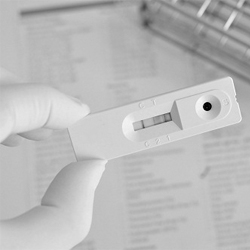TruQuick™ Rubella IgM
Rubella virus is a member of the Togaviridae family, found mainly in human populations. Generally rubella is considered a mild adolescence disease. However a maternal infection could be transmitted through the placenta to the fetus, causing congenital rubella. Primary rubella infection contracted during early pregnancy, may have severe consequences as severe fetal damage, stillbirth or abortion. Children born asymptomatic may develop these abnormalities later in life.1, 2 Widespread vaccination has significantly reduced the incidence of rubella in all age groups. However, 10 to 20% of young adults still appear susceptible to the virus. To reduce the risk of severe complications, accurate serological methods must be performed to determine the serologic status of childbearing-aged women. TruQuick Rubella IgM is a rapid chromatographic immunoassay for the qualitative detection of IgM antibodies to rubella virus in serum or plasma specimens.
- Remove the Test Cassette from the sealed pouch and use it within one hour. Best results will be obtained if the assay is performed immediately after opening foil pouch.
- Place the Test Cassette on a clean and level surface. Hold the dropper vertically, draw the specimen about 1 cm above the upper end of the nozzle as shown in the illustration below.. Transfer 1 full drop (approx. 20 μL) of specimen to each specimen well, then add 2 drops of Buffer (approximately 80 μL) to the sample well and start the timer. See the illustration below.
- Wait for the colored line(s) to appear. The result should be read at 15 minutes. Do not interpret results after 20 minutes.
- Mellinger AK, Cragan ID. Atkinson WL et al. High incidence of congenital rubella syndrome after a rubella ourbreak. Ped Infect Dis J. 1995;14:573-5.
- Herrman KL. Rubella virus In: Lennette EH, Balows AC, Hausler WJ, Shadomy HJ. editors. Manual of Clinical Microbiology, ASM, Washington, DC. 1985;Ch. 6.779-754.

